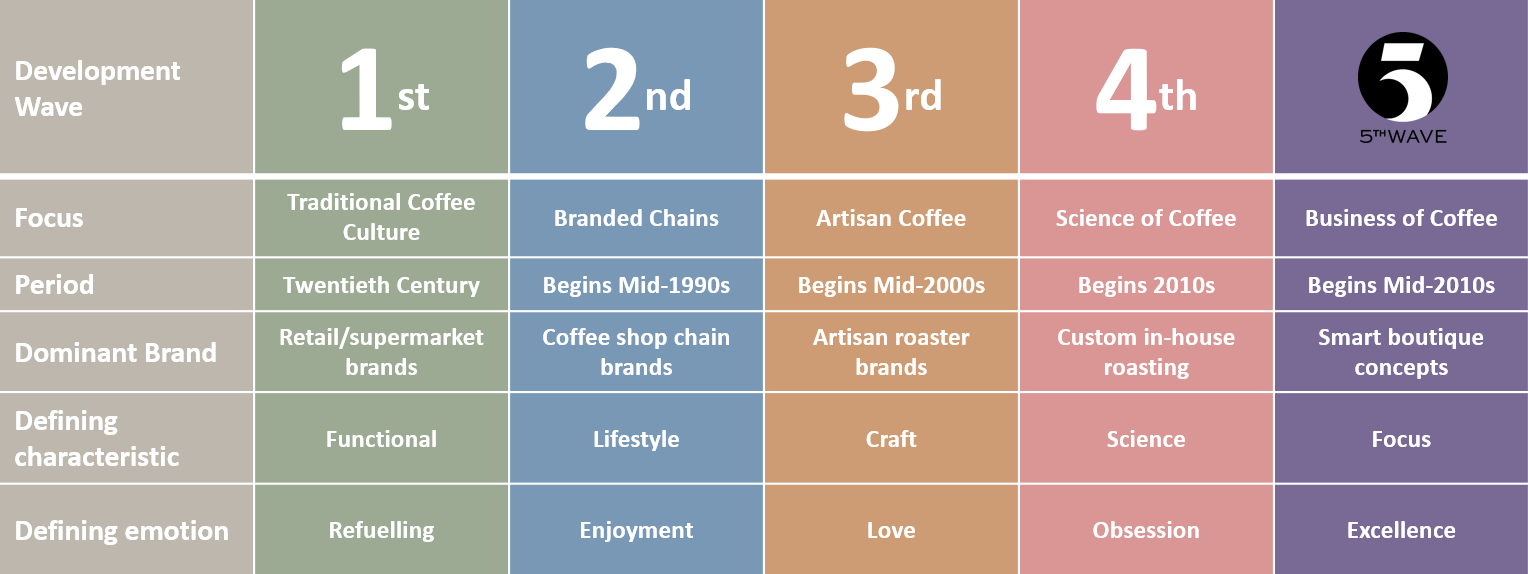
As Allegra Strategies launches a magazine on the business of coffee, called 5th Wave, United Baristas examines coffee industry trends
Long-time proponents of analysing the coffee industry through its ‘waves’, Allegra Strategies have launched a magazine called 5th Wave, focusing on the business of coffee.
Allegra Group is most well-know as organisers of the London Coffee Festival proposes that the coffee industry is best understood through a progression of waves, which mark changes in the style of coffee business.

Waves of Coffee?
The idea of waves was first introduced by to explain the changes in consumer habits with the arrival of Third Wave coffee in the late 1990s and early 2000s, with the term Third Wave becoming virtually synonymous with Specialty Coffee.
Allegra analyses the coffee shop market and suggests there has been been significant changes to coffee shops since the arrival of Third Wave coffee in Europe around a decade ago. Allegra is so committed to the idea that they have trademarked the term ‘The Fifth Wave‘.
You can understand more about their concept in the magazine.
It’s an ongoing point of discussion within the industry whether we are still in the third wave, or are now is a post-specialty coffee era. For example, noting the increasing ubiquity of specialty coffee in 2016 coffee blogger James Hoffmann asked what happens when Specialty stops being special?
What’s beyond the Third Wave
It’s interesting to speculate about what lies in the industry’s future.
United Baristas founder Tim Ridley has posited that a hallmark of a shift in consumer tastes will be an explosion of flavour-driven blends by specialty coffee roasters, which are primarily expressions of their brand rather than the coffee’s terroir. These blends would tap into rising consumer demand for consistency and quality, whilst retaining credibility of sourcing and provenance. It would be a significant departure from the Third Wave coffee movement which has put seasonality and lot provenance at the centre of its values.
This consumer trend and business strategy is well established in the alcohol industry. Good examples are the well-known blend Diageo’s Johnnie Walker or Grant’s single malt Glenfiddich 15, both of which are popular and acclaimed.
The coffees in these blends would change over time depending on the season and availability, but the brand and the flavour profile remain the same.
The end of the Third Wave?
It’s highly premature to call time on coffee’s Third Wave just yet.
Much of the coffee industry continues to define itself as specialty coffee and see the Third Wave values of appreciating the distinctive flavours of varietal, processing and and growing region driving consumer demand, dictating sourcing and shaping current business strategy. And the coffee industry still has a long way to go before the current trajectory reaches its logical conclusion of being able to identify and communicate terroir, like happens in the wine industry with well understood and defined expressions such as Bourgogne or Rioja.
Furthermore, a transition to a post-Third Wave era is likely for only a portion of the specialty coffee industry. Both Diageo and William Grant & Sons have other brands and products which are more akin to Third Wave coffee, such as single malts and specific cask finishes. Both companies also regularly release small-batch, limited edition whiskies which are most similar to the season lot unit commonplace in specialty coffee.
Similarly, almost all wine producing regions have a mix of large-scale, industrialised wine maker producing for for a defined flavour profile, as well as smaller producers making wines at the dictates of the season and cask. There is no reason to think that coffee will be any different.
A kaleidoscope of coffee
A useful way to see this mix of product types is not as the progression of waves, but as natural market segmentation. That is, companies creating specific products to meet various consumer demands.
United Baristas has previously written about the need for coffee businesses to identify and win a specific customer audience, and we are excited to see the industry continuing to grow through the development of products and brands that meet various customer niches.
A more segmented and niche-focused coffee industry is in the common interest, but equally it’s important to retain a common, big-tent name and concept under which the industry can rally. Whether this is Third Wave, Specialty Coffee, or another term, the contemporary coffee industry is a wonderful kaleidoscope of interests, approaches and beliefs.
United Baristas believes that it is only by working together that we can both embrace our diversity and continue to celebrate and promote our favourite drink, coffee. Whether you define yourself as second, third, fourth, fifth or sixth wave, we understand that you are working hard to win and serve customers – and you are most welcome here.
What do you think?
Has coffee outgrown the Third Wave term? Is specialty coffee no longer special? Would you drink a new specialty coffee blend? Your thoughts and feedback are always welcome. Comment below, and we’re on all the usual channels.
